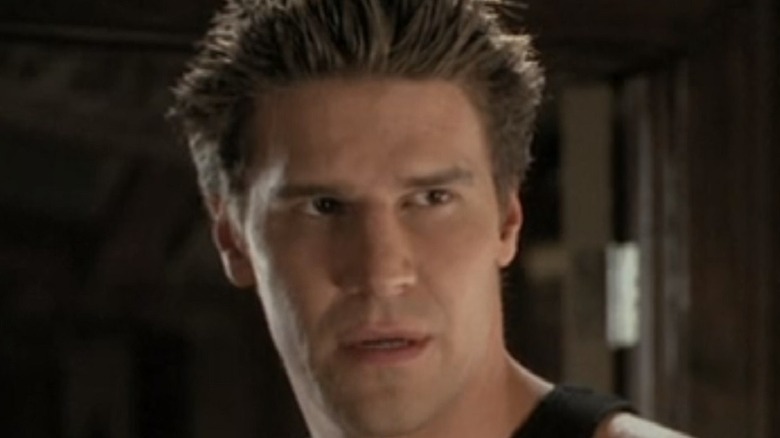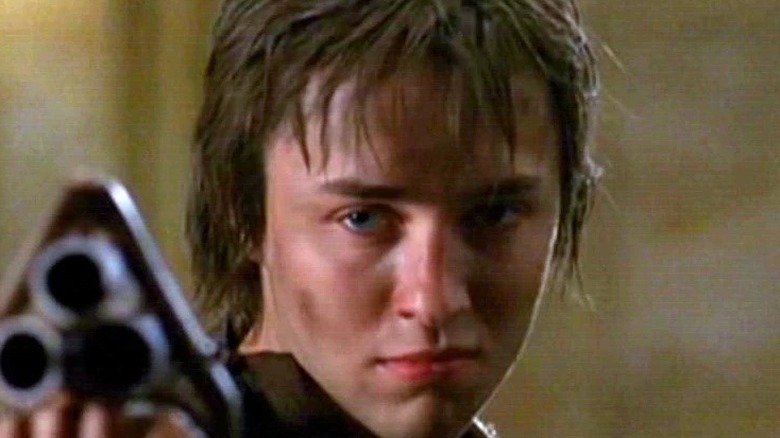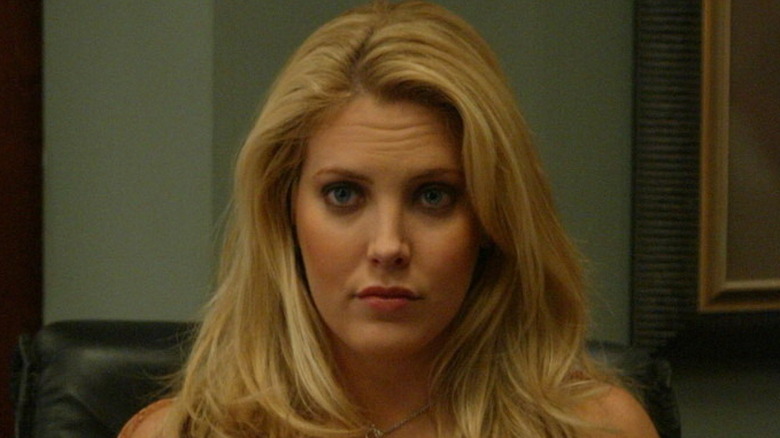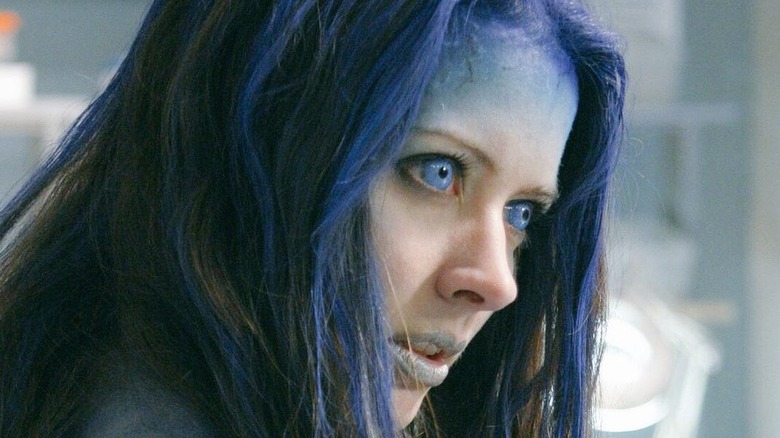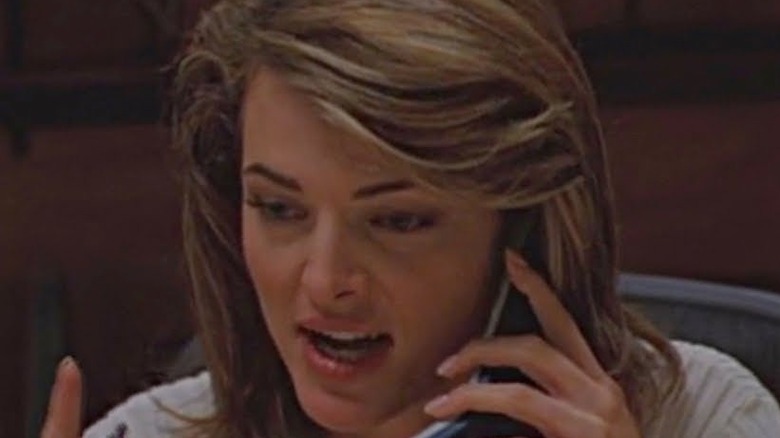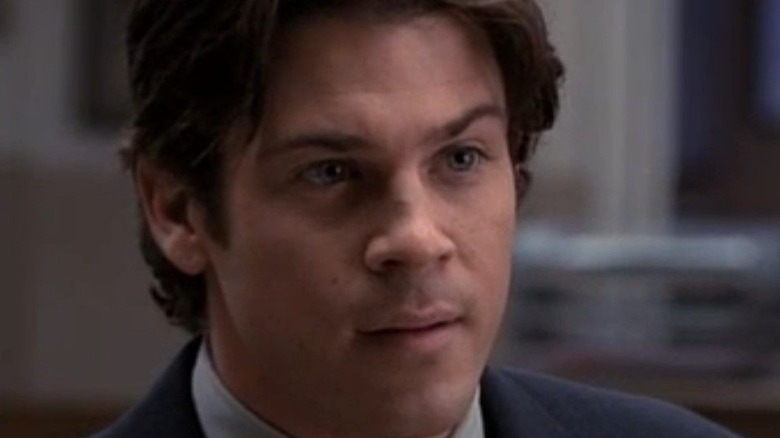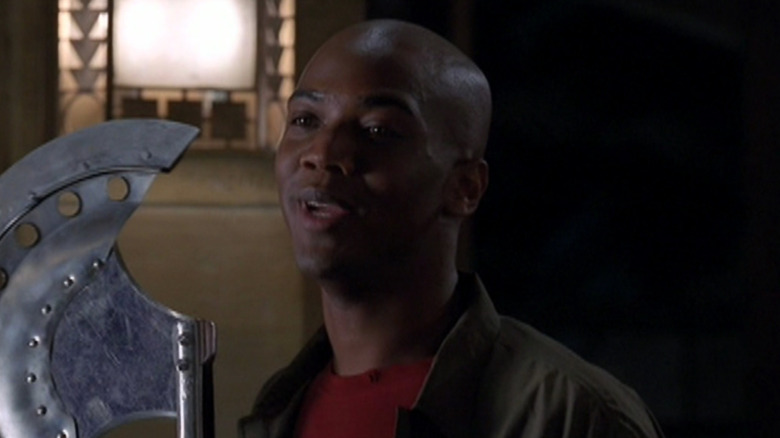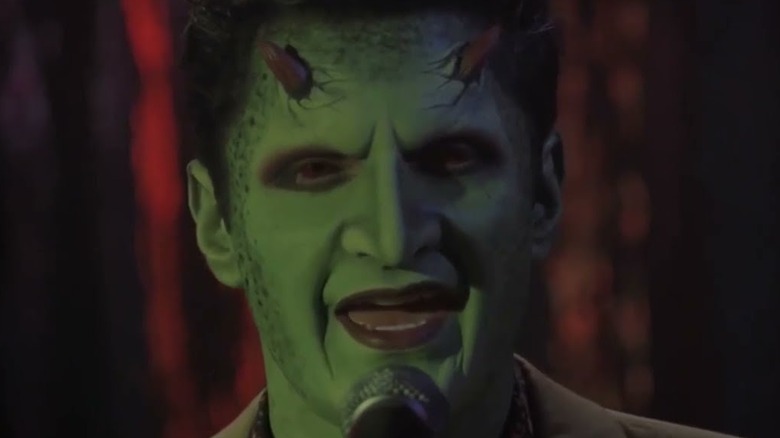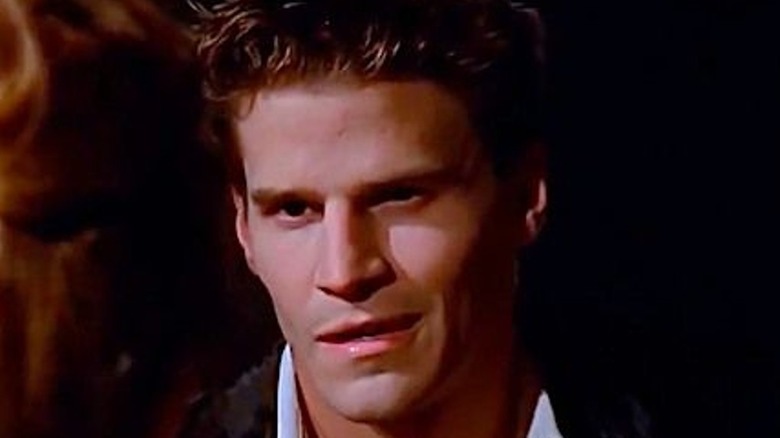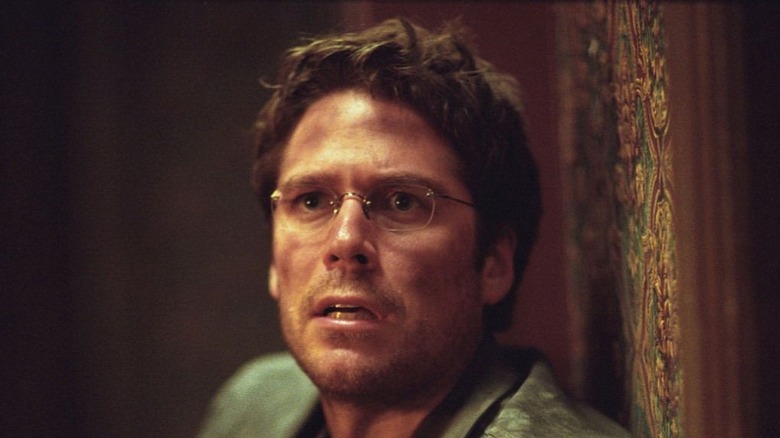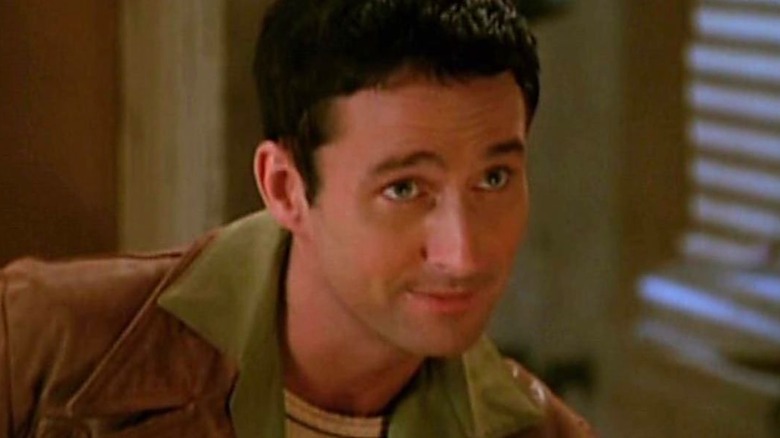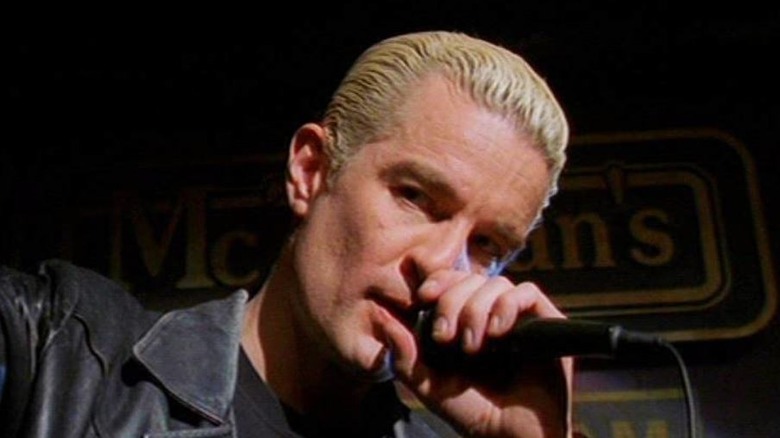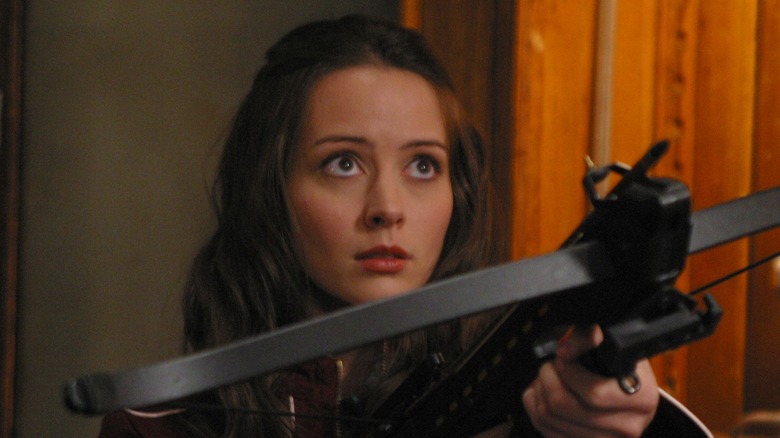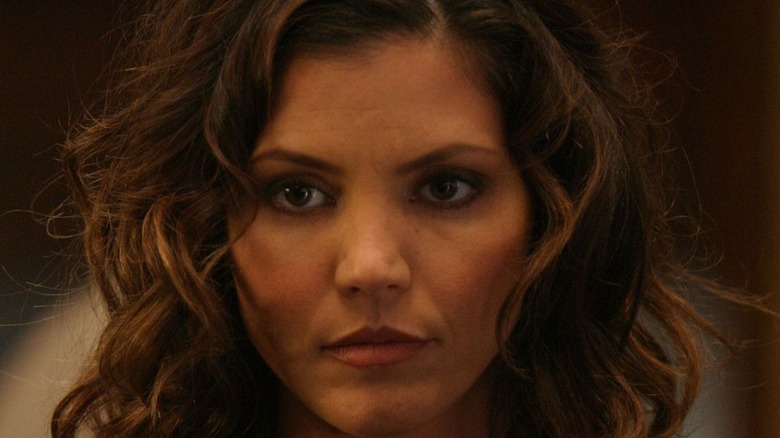Angel Characters Ranked By Likability
Created by David Greenwalt and Joss Whedon, the under-appreciated supernatural series "Angel" has a lot of hidden depths. This noir-style, L.A.-based, spin-off of "Buffy the Vampire Slayer" which is one-part horror/crime, one-part dark comedy and one-part "classic workplace drama" is a consistent, compelling gem that often gets buried under the legacy of its sister show. Academics and media critics alike have written expansive content dedicated to "Buffy," but the same cannot be said for its grittier counterpart, less focused on coming-of-age and more focused on blazing (not always successful) paths toward atonement — and on emphasizing the importance of continuing to fight against the evils of the world even when others fall.
There are many lists out there assessing the Scooby Gang. Today, however, we're going to put a much-deserved spotlight on the characters of "Angel," all of whom enter the show's narrative with a lot of baggage and a lot to learn as they struggle (and sometimes fail) to become better people and "help the helpless."
To rank the Angel Investigations team, as well as notable recurring villains, from least to most likable we've created a (super scientific!) five-trait system of measurement. It takes into account each character's charisma, charm, wit, relatability, and capacity to evoke empathy. In addition, to make a final judgment, we considered where each character was by the end of their arc on the series.
14. Connor Reilly
The Powers That Be deal Connor an awful hand, but up until the fifth season, he's never actually likable. In fact, according to our five-trait system, he ranks dead last in terms of likability, and many Reddit users hate Connor with an enduring vehemence. We think of him as the Dawn Summers of "Angel" because both teens are initially introduced as plot devices, only Connor's given even less opportunity to grow.
Raised in the violent hell of Quor'toth, he spends his formative years dependent on the embittered Daniel Holtz, who manipulates him into becoming a cold-blooded weapon who's only known hatred and bloodshed. By the time Connor re-enters Angel's life, the teenager's not particularly charming or charismatic, though he does possess a sliver of wit. But the real issue with this supernaturally-enhanced human son of two vampires is, for the bulk of his tenure, he's irredeemably malicious, intentionally working against the team. He even sinks a chained Angel to the bottom of the Atlantic, condemning the vampire to a living death while encased in a watery grave.
Still, if we consider his upbringing, the layers of ick surrounding certain Oedipus-themed, "Cordelia"-related events, and his suicidal depression in response to ending world peace, Connor does evoke some empathy. And, to be fair, Jasmine's version of peace is horrific.
Thankfully, with the aid of (fabricated) memories of a normal, well-adjusted life, Connor eventually improves as a person and starts to become someone we can root for.
13. Harmony Kendall
Introduced in "Buffy the Vampire Slayer," first as a petty Sunnydale student and then as a vain-as-ever vampire, Harmony can be a joy to watch on screen amid all her shallow glory — but that doesn't make her likable. After being sired during the Scooby Gang's catastrophic graduation ceremony, she eventually ends up in L.A., entering Angel's world as his secretarial assistant at evil law firm Wolfram & Hart.
Harmony helps lighten the show's darkest season with genuinely funny moments — like when she asks Angel for a letter of recommendation after he fires her for betraying the team. But such delightful exchanges also represent why she ranks near the bottom of this list. Harmony doesn't care about her betrayal or the fact that the senior partners are raining down apocalyptic chaos. She's just concerned with Angel's (totally fair) lack of confidence in her. Exceptionally self-absorbed and dangerously susceptible to stronger-willed people, it's a good thing there's humor in her perceived plights, because she's not particularly relatable, and she doesn't evoke much empathy. Ultimately, she's that person who constantly falls upward, somehow managing to land on her well-pedicured feet before climbing to greater heights on both the corporate and social ladders.
It's important to note the difference between charismatic and likable here. Being invested in characters' arcs doesn't mean they are compelling (fictional) people. Like Tony Soprano, Don Draper, and Gob Bluth, the charismatic Harmony is nonetheless a despicable person. She's evil and soulless, after all.
12. Darla
Sire to Angel and mother to Connor, Darla was also first introduced in "Buffy." Once a wealthy prostitute with a nihilistic view of the world, Darla left her human life behind willingly to become a soulless vampire before the events of either show. As an undead creature of the night, Darla's cruelty toward (and manipulation of) others knows no bounds. In addition, when it comes to Angel, she often falls prey to pettiness and jealousy. Regardless of her undesirable traits, her arc is a compelling and fulfilling one. From newly-minted human (dying of syphilis) to pregnant vampire tormented by the soul of her unborn child, Darla goes through a lot of transformations.
A ruthless femme fatale who has mastered the art of seduction, she uses beauty and sexual charm to lure victims to their deaths, but if you look at her the way actor Julie Benz does, as the "jilted ex-wife" of Angel, then she becomes a relatable woman you can occasionally empathize with. And while she may not be charismatic or witty, and while nobody in their right mind would want to be friends with her, her love for Angel is pure. So is her eventual sacrifice — after a life prioritizing her own self-preservation, Darla finds an opportunity for redemption by staking herself so baby Connor, who comes into the world bathed in his mother's ashes, can live.
11. Illyria
Even with her once-expansive abilities muted, ancient demon-god Illyria is a blue-haired, badass warrior with an engaging journey and an impressive screen presence. Responding to a thread asking fans to rank the main gang, one Reddit user described her as "endlessly fascinating," arguing the guidance a grieving Wesley provides her is "bittersweet but compelling."
She's a well-loved character. But at the same time, Illyria is the perfect example of how a fan-favorite player viewers love to watch is not necessarily a likable person. After all, liquefying the organs of an Angel Investigations team member and using the hollowed-out, newly-hardened corpse as a host for one's demonic essence is not a great way to make friends. As if that's not already enough to knock her down a few pegs on the likability scale, she's also ruthless and arrogant with an insatiable penchant for violence. And, as a god-like being, she views pretty much everyone around her as lesser.
While Illyria's magnetic, with characters and viewers alike gravitating toward her intense gaze and eccentric mannerisms, and you can empathize with the hopelessness and aimlessness consuming her when she discovers her armies decimated, it's doubtful she understands wit, and don't forget the hand she plays in Fred's death. The lessons in humanity from Wesley and her entertaining spars with Spike soften the blow, but the reality of it all still hurts.
10. Lilah Morgan
You know you have a villain with longevity when Redditors dedicate discussion threads to her with enthusiastic titles like "Lilah Morgan Appreciation Post!!!!" and "Lilah Morgan – Why Do You Love Her?"
Unabashedly, unashamedly, and unapologetically evil, Lilah begins her tenure on "Angel" as a lawyer before becoming co-head of Special Projects at Wolfram & Hart after all of her colleagues in that branch of the firm (sans Lindsey McDonald) are slaughtered by Drusilla and Darla, and she makes no excuses for the abominable actions she takes in any evil scheme. Honestly, she's comfortable with herself in the same way that Lilith (Michelle Gomez) from "The Chilling Adventures of Sabrina" is. And for that — and for her razor-sharp wit — some might even consider her somewhat of a feminist icon, especially once they consider how fierce and calculating she must be to survive and thrive in a male-dominated world (and workplace).
Because of this, viewers are able to relate to her, even if her cold, calculating manner frequently make it difficult to empathize with her in any truly meaningful way.
9. Lindsey McDonald
Lindsey McDonald doesn't have the commanding fierceness business colleague Lilah does, but the show does give viewers more of an opportunity to empathize with who he is and the past that shaped him. In addition, he actually has a moral compass. Whereas Lilah is simply devoid of a conscience, Lindsey's self-serving brand of evil developed out of necessity. Raised in significant poverty, with "no shoes, no toilet," and two of his six siblings dead after one bad flu season, Lindsey knew struggle and tragedy at a young age. By the time Holland recruited him into the hell of L.A.'s corporate world, Lindsey had clawed his way up, but he'd also internalized a deep-seated distrust of everyone.
Despite his grievances against the ensouled vampire for the loss of his right hand, Lindsey sometimes allies himself with the Angel Investigations team, and through his aid in saving children from an assassin, and his assistance in taking down a grotesque trafficking operation involving organs from unwilling (and still living) donors, viewers glimpse the possibility of redemption for him. Other times, though, he's a bitter, grudge-filled, and untrustworthy thorn who frequently plots Angel's demise.
The murky morals make for an engaging internal dilemma and an intriguing character arc, and more often than not, viewers want Lindsey to fight for atonement because they like who he has the potential to be (and sometimes is). Unfortunately for us and him, future-reading Lorne knows he'll never attain it.
8. Charles Gunn
Growing up in a part of the inner-city that even police won't go near, Gunn hardened into a military strategist and teenage vampire killer who stood at the helm of his own street-fighting gang, battling monsters via guerilla warfare to keep his streets safe for his sister and others. When his narrative in this supernatural series first begins, his distrust of Angel and rigid view of good and evil results in the death of his sister.
While blunt, stubborn, and occasionally self-destructive, Gunn's also deeply loyal to his friends, and as a character, has a lot of subtle depth. Even though he doesn't have the same charisma, charm, or wit as others do, his struggles are painfully relatable and easy to empathize with. Viewers can understand how his feelings of uselessness lead to him allowing the folks at Wolfram & Hart to operate on his brain to give him a comprehensive understanding of law. When these new (apparently always temporary) skill-sets start subsiding, Gunn bargains for a permanent upgrade — playing a direct hand in Fred's death by (albeit unknowingly) releasing Illyria's sarcophagus from its hold in customs. Wracked with guilt, Gunn takes Lindsey's place in the firm's suburban hell Holding dimension in an effort to redeem himself.
All told, "Angels" fans like Gunn quite a bit. They are glad he gets to atone and keep fighting as the apocalypse nears, but his frustrating stubborn streak, impulsive recklessness, and the role he plays in Fred's demise ultimately dampens his likability factor.
7. Lorne
The empathic, peace-loving demon, Krevlornswath of the Deathwok Clan (known as "The Host" by his patrons and "Lorne" to the team) is an absolute sweetheart who prefers to handle conflicts diplomatically whenever possible and just wants everyone to get along.
Born to Pylean warriors, his gentle nature and refusal to hunt beasts made him a shameful stain to the family name before he was pulled through a dimensional portal. As an L.A. implant with a fondness for Seabreezes, music, and the L.A. nightlife, Lorne uses his karaoke bar, meant to be a neutral haven for demons and humans from all walks of life, to read the auras and futures of others. Charismatic in that he has a remarkable stage presence, and charming in that he's just so ridiculously good-natured, it's difficult to see how anyone could not like (and care about) this sharp-witted pacifist who's the black sheep of his family and who has earnest faith in the inherent goodness of everyone — especially when played so brilliantly by the late Andy Hallet.
The reason Lorne lands very comfortably in the middle of this list (and not higher) is because of his significant personality change in Season 5, when working as the head of Entertainment at Wolfram & Hart begins to deflate and demoralize him. By the end of this stint, Lorne has become cynical and full of loathing. He even (though begrudgingly) breaks his own moral code by doling out carnage at Angel's request in the show's final hour.
6. Angel
Angel (David Boreanaz), the broody and socially-awkward vampire with a soul, may have been the Slayer's first love, but as a character, he's much more likable when he heads to L.A. to atone for his bloodstained past, initially forming Angel Investigations with the aid of part-demon Doyle and struggling actor Cordelia.
As the lead in a show focused on the tumultuous and nonlinear path toward redemption, Angel really comes into his own. From his endearing confusion over social cues to his joy over rediscovering food when he's briefly human again to his embarrassment (and sudden excitability) during his time as a felt puppet to his heated argument with Spike over whether a caveman or astronaut would win in a fight, the Angel of "Angel" displays a charisma, charm, wit, and vulnerability that the Angel of "Buffy" had not yet developed.
Here in the hell-infested city of L.A., this ensouled vampire's motivations are easier to recognize, his desire to "help the helpless" is clear and distinct, and who can't empathize with his introverted nature and strong preference to sit and sulk in the dark over going out for a round of drinks with his team? But he lands closer to the middle of this list because we can't forget that, even with a soul, he still has some creepy stalker tendencies (however well-intentioned they might be).
5. Wesley Wyndam-Pryce
Having been sacked by the Council, the bumbling former Watcher Wesley, initially known for his ruthless logic and clearly feigned over-confidence, barrels into Angel's world on his motorcycle, leather-clad and bragging about being a "rogue demon hunter." It's quite an entrance. With invaluable knowledge of the occult, and occasionally cold objectivity (which stems from being raised by an emotionally abusive Watcher father), Wes serves as a blend of Scoobies Willow (Alyson Hannigan) and Giles — he's smart, studious, and quirky, but he's also posh and pragmatic.
At first uncertain of his place in the world, his work with Angel Investigations allows him to grow into a genuinely confident, capable leader willing to make difficult choices (there's a reason Angel calls him "the guy who makes all the hard decisions, even if you have to make 'em alone"). Wesley also often puts himself in harm's way for the sake of others. Not only does he protect fugitive Faith from the Council after she tortures him, he takes a bullet for Gunn while protecting his friend (and his friend's friends) from the police, and he feeds Angel his own blood after rescuing the starved vampire from the depths of the Atlantic Ocean. Even his involvement in Connor's kidnapping is driven by a desire to protect both father and son from a potentially damning prophecy. And what he lacks in charm and charisma, he more than makes up for in self-deprecating wit, relatability, and his capacity to evoke empathy.
4. Allen Francis Doyle
Does it matter that founding Angel Investigations member Doyle (magnetically played by the late Glenn Quinn), only appears in nine episodes — sans his posthumous cameo in "You're Welcome"? Nope. Doyle's charm is impossible to forget, and the chemistry he shares with Angel and Cordelia is unmatched. It's a relationship the two remaining members of the original trio never quite replicate with future teammates.
Half-Irish, half-Brachen-demon, and servant to The Powers That Be, charismatic seer Doyle slides into Angel's world a witty (and often very sweet) schmoozer haunted by the tragic mistakes of his past, still struggling to accept his demon side. Embarrassed, he hides that part of him from the most recent love of his life, Cordelia, because of how much he desires her acceptance.
When the Scourge, an army of (very Nazi-like) pureblooded demons who slaughter beings of mixed blood (and who slaughtered Doyle's own brethren years before) returns to the city to wipe out a clan of Lister demons, Doyle, with Cordy and Angel by his side, finally finds the courage to right the wrongs he committed through his own inaction and cowardice, earning the title of "Hero." Even though his atonement and devastating sacrifice come before the other main characters' journeys truly begin, Doyle remains one of the most relatable, empathetic characters the show has to offer. And in that way, he becomes a constant, invisible presence and the soul of the series long after his — and the actor's — death.
3. Spike
Ensouled vampire Spike (James Marsters) provides another bright spot in the grim final season of "Angel." Considering his own grand sacrifice in the finale of "Buffy," and the fact that his character can often overshadow other Angel Investigations teammates, fans on Reddit are conflicted regarding the creators' decision to include Spike in Season 5. But that doesn't mean it's easy to deny this sentimental vampire's charisma, charm, and wit. We can even relate to his dead dreams of being a poet and how fully he throws himself into his projects.
On top of that, with his complicated history and continued search for atonement, his character seamlessly fits into the show's core themes. There's a particular moment in Buffyverse history that depicts Spike (still soulless at this point) attempting to assault the Slayer in her bathroom. It's horrendous and devastating, but he stops himself, and in the aftermath, desperately seeks redemption, fighting for the restoration of his soul (and succeeding). While it's hard to condone the atrocities he committed while evil (in the same way it is hard to condone the actions of Angelus), one can appreciate (and empathize with) his quest to do so and be better in both the last season of "Buffy" and the last season of "Angel."
Also, if it weren't for Spike's presence in the fifth season, how would viewers ever get the hilarious "Angel the Muppet vs Spike" scene, or the heated "Cavemen vs. Astronauts" debate?
2. Winifred "Fred" Burkle
Pancake-loving Fred (Amy Acker) is perhaps one of the most likable characters in the history of the show — and in the entire Buffyverse.
Born in a small Texas town to two loving parents, she moved to L.A. to attend graduate school at UCLA, only to be condemned to years of enslavement and trauma by her jealous physics professor. She meets Angel (and company) when he happens upon her in Pylea during a Cordelia-focused rescue mission, and when the gang brings her back to California, she decides to stick around the Hyperion Hotel rather than return home to her parents. Soon enough, her resourcefulness and genius-level IQ become invaluable assets. Though initially (and understandably) a bundle of nervous energy, Fred turns out to be a sweet, kind-hearted team member with a sharp sense of humor that's softened by a refreshingly sunny personality.
More Willow-like than Wesley, and as a result more endearing, thankfully she never "goes dark." What's more striking is that she even has a calming effect on Angelus. Not only that, she's the first to have faith in and fight for Spike when he arrives at Wolfram & Hart as an incorporeal ghost. Ultimately, the unassuming Fred comes across as relatable and empathetic, and she ranks high on this list because she's both a great character and a great (fictional) person.
1. Cordelia Chase
When we first meet the ever-charismatic Cordelia Chase (Charisma Carpenter) in "Buffy the Vampire Slayer," she's a standoffish "mean girl" who hides her intelligence behind an armor of shallow vanity and materialism. The time she spends with the Scooby Gang in high school softens her egotistical edges, but the character's real — and more powerful — transformation from self-absorbed snob to snarky but charming and kind-hearted hero doesn't happen until she moves to L.A. and launches the supernatural detective agency with ensouled vampire Angel and half-demon Doyle.
In early Season 1, money-minded, struggling actor Cordy is still the quippy girl viewers knew in those Sunnydale High days, but Doyle's final gift to her — his premonitions — changes all that, helping her strip off that lingering selfishness and vanity so she can truly come into her own and become a relatable character — as well as one worth caring about. Initially bitter about receiving the painful, migraine-inducing flashes of the future, Cordy eventually accepts and embraces this new reality once she understands that, in transferring his mystical powers to her, Doyle's given her the most valuable thing he has. As a result, with Angel's new line to The Powers That Be, Cordelia grows into a compassionate woman driven to live and die by Angel Investigations' "we help the helpless" mission and philosophy.
In that way, the humbled Cordy becomes the very heart of "Angel," and arguably — by the end of the series — the show's most likable character.
